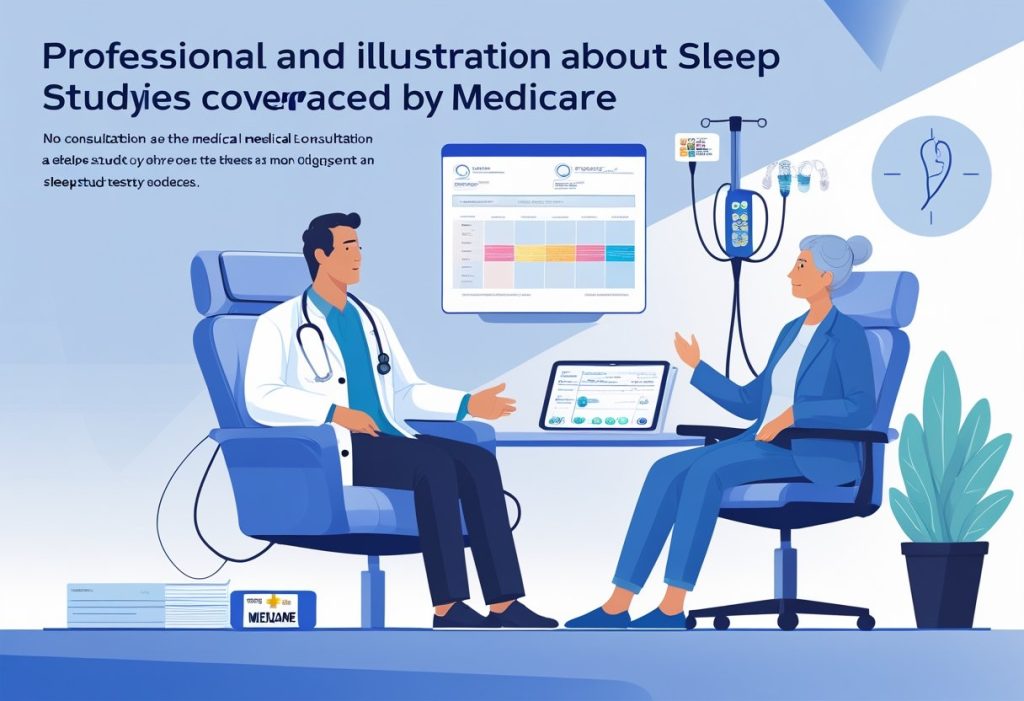Navigating Medicare can be complex, especially when it comes to specific services like sleep studies. Medicare does cover sleep studies if they are deemed medically necessary by your physician. This coverage is crucial for those experiencing symptoms of sleep disorders such as sleep apnea, narcolepsy, or parasomnia.
Understanding the details of this coverage can empower you to make informed decisions about your health. The Modern Medicare Agency stands ready to assist you with tailored guidance. Our licensed agents provide personalized support, ensuring that you find Medicare packages that meet your unique needs without incurring excessive costs.
As you explore the benefits of Medicare coverage for sleep studies, you’ll gain valuable insights into how to access the care you require. The information provided will help clarify the eligibility criteria and the steps to take for your diagnosis and treatment.
Does Medicare Cover Sleep Studies?
Medicare provides coverage for sleep studies under certain conditions, focusing on medically necessary procedures to diagnose various sleep disorders. Understanding the criteria, eligible conditions, and specific types of sleep studies covered by Medicare is crucial for navigating your healthcare options.
Criteria for Medicare Coverage
To qualify for Medicare coverage for sleep studies, the tests must be deemed medically necessary by your healthcare provider. This usually involves a formal diagnosis of a sleep disorder.
Coverage is typically under Medicare Part B, which applies to outpatient services. If you have Original Medicare, you might pay 20% of the Medicare-approved amount for the study, and the annual Part B deductible applies.
It’s essential that the sleep study is performed in a Medicare-approved facility or sleep center. This ensures that the testing meets the criteria set forth by Medicare for adequate diagnosis and treatment.
Eligible Sleep Disorders
Medicare covers sleep studies for various sleep disorders, including the most common conditions like:
- Sleep Apnea: A serious condition where breathing repeatedly stops and starts during sleep.
- Narcolepsy: Characterized by excessive daytime sleepiness and sudden sleep attacks.
- Parasomnia: Involves abnormal behaviors during sleep, such as sleepwalking or night terrors.
These conditions need proper diagnosis to receive the necessary treatment, which is why a sleep study becomes essential. The testing helps determine the severity and helps tailor the treatment plans accordingly.
Types of Covered Sleep Studies
Medicare covers several types of sleep studies, primarily categorized into:
- Type I studies (Polysomnography): Often conducted in a sleep lab, these studies monitor various physiological signals during sleep.
- Type II, III, and IV studies: Can be done either in-home or in a sleep center, focusing on specific parameters related to sleep apnea and other disorders.
The right type of study will depend on your health needs and the recommendation of your physician.
For personalized guidance and assistance in navigating your Medicare options, choose The Modern Medicare Agency. Our licensed agents are available to discuss Medicare packages tailored to your needs without any hidden fees.
Types of Sleep Studies and Testing Locations
Understanding the types of sleep studies available and where they are conducted can help you make informed decisions regarding your health. Different testing methods vary in their procedures and locations, leading to specific advantages based on your needs.
Polysomnography in Sleep Clinics
Polysomnography is a comprehensive sleep study performed in a sleep clinic or lab facility. It involves monitoring various physiological parameters while you sleep. During the test, specialists track:
- Brain activity
- Oxygen saturation levels
- Heart rate
- Breathing patterns
This method is particularly effective for diagnosing conditions such as obstructive sleep apnea (OSA), where snoring and breathing interruptions occur. The clinical setting allows for real-time analysis and intervention if necessary. Typically, you will stay overnight, ensuring a thorough analysis of your sleep cycles, which can lead to more accurate results.
Home Sleep Apnea Testing
Home sleep apnea testing is an increasingly popular alternative to in-lab studies. This method allows you to monitor your sleep in the comfort of your own home. The home test typically involves a simplified device that measures:
- Breathing patterns
- Oxygen saturation
- Heart rate
While it may not provide as comprehensive data as polysomnography, home testing can still effectively assess for sleep apnea and is more convenient. You will be given clear instructions to set up the device, usually allowing for a more relaxed testing environment that may yield natural sleep results.
Comparison of In-Lab vs. Home Studies
When considering in-lab polysomnography and home sleep apnea testing, each option has unique advantages.
- In-Lab Studies
- Pros: Comprehensive data collection, real-time monitoring, immediate access to medical support.
- Cons: More invasive, requires an overnight stay.
- Home Studies
- Pros: Comfortable environment, less invasive, more straightforward setup.
- Cons: Limited data collection, potential for less accuracy.
Choosing the right approach depends on your specific symptoms, health needs, and comfort level. At The Modern Medicare Agency, our licensed agents can guide you in understanding your options and finding the Medicare coverage that best fits your requirements.
Sleep Disorders Diagnosed by Sleep Studies
Sleep studies play a critical role in diagnosing various sleep disorders. Each condition requires specific testing methods to ensure accurate assessment and effective treatment. Understanding these disorders helps you navigate your healthcare options better.
Obstructive Sleep Apnea
Obstructive Sleep Apnea (OSA) is characterized by recurrent breathing interruptions during sleep due to blocked airways. Common symptoms include loud snoring and excessive daytime sleepiness, which can significantly impact daily functioning. A sleep study, or polysomnography, helps diagnose OSA by monitoring your breathing patterns, oxygen levels, and heart rate throughout the night.
If diagnosed, Medicare may cover treatments such as Continuous Positive Airway Pressure (CPAP) therapy, which maintains open airways during sleep. Proper management reduces the risk of related health issues, such as hypertension and stroke. Understanding your options is essential, especially when seeking assistance from organizations like The Modern Medicare Agency, which can guide you in finding suitable Medicare plans.
Narcolepsy and Parasomnia
Narcolepsy is a neurological disorder that causes extreme daytime drowsiness and unexpected sleep attacks. It can lead to significant lifestyle disruptions and may require a detailed sleep study for diagnosis. During the test, your brain activity, muscle tone, and eye movements are monitored to verify narcolepsy symptoms.
Parasomnia encompasses abnormal behaviors during sleep, such as sleepwalking and night terrors. It often coexists with other sleep disorders, making diagnosis challenging. Sleep studies can help delineate these behaviors and their impact on your sleep quality. Treatment options may include medication or lifestyle changes, emphasizing the importance of understanding your specific needs.
Chronic Insomnia and Restless Leg Syndrome
Chronic insomnia involves persistent difficulties in falling or staying asleep, leading to fatigue and mood disturbances. Sleep studies can help identify underlying causes, including medical conditions or psychological factors. Cognitive-behavioral therapy is often recommended in conjunction with other treatments to help you improve your sleep patterns.
Restless Leg Syndrome (RLS) is a condition that causes uncomfortable sensations in the legs, often leading to an irresistible urge to move. It typically worsens at night and can disrupt sleep significantly. A sleep study can confirm RLS and guide appropriate treatment strategies, including iron supplements or lifestyle alterations.
By understanding these disorders, you can make informed decisions regarding your health and seek support from The Modern Medicare Agency to navigate your Medicare insurance options.
Medicare Coverage for Sleep Apnea Treatment
Medicare provides comprehensive coverage for sleep apnea treatment, ensuring beneficiaries can access necessary equipment and therapies. This section details the specifics regarding CPAP machines, the trial period for CPAP therapy, and coverage for durable medical equipment.
CPAP Machine and Supplies
If diagnosed with sleep apnea, Medicare Part B covers CPAP (Continuous Positive Airway Pressure) therapy, which includes the machine and necessary supplies. To qualify for this coverage, your physician must confirm the medical necessity through a sleep study.
Key components covered include:
- CPAP Machines: These devices maintain airway pressure during sleep to prevent interruptions in breathing.
- Supplies: Medicare helps cover accessories like masks, tubing, and filters, crucial for effective therapy.
You usually pay a portion of the costs after meeting your deductible, which may vary depending on your plan.
CPAP Therapy Trial Period
Once prescribed, Medicare covers a three-month CPAP therapy trial. This allows you to assess how well you respond to the CPAP machine. During this period, regular follow-ups with your healthcare provider are essential.
Coverage includes:
- Initial Setup: Medicare covers the setup and necessary adjustments for your CPAP machine.
- Monitoring: Your doctor will evaluate your use and effectiveness of the therapy during this trial.
Successfully demonstrating a positive response to the therapy can lead to ongoing coverage.
Coverage for Durable Medical Equipment
Medicare considers CPAP machines as durable medical equipment (DME), which is vital for managing your sleep apnea. Under Part B, coverage applies to equipment prescribed by your healthcare provider and deemed medically necessary.
Important notes include:
- 30-Month Rental Period: Most CPAP machines are rented for a period of 13 months, after which you own the device.
- Ongoing Supplies: Medicare will continue to cover necessary supplies for CPAP therapy, provided they are prescribed and meet the standards for medical necessity.
Navigating Medicare benefits can be complex. The Modern Medicare Agency specializes in guiding you through the process. Our licensed agents offer personalized assistance to find plans that fit your unique needs, without hidden fees.
Costs and Coverage Differences by Medicare Plan
Understanding the costs and coverage for sleep studies under various Medicare plans is crucial. Each plan has distinct features that affect your out-of-pocket expenses and the types of coverage available.
Original Medicare Out-of-Pocket Costs
Under Original Medicare, which includes Medicare Part A and Part B, costs for sleep studies are categorized as outpatient services. When you undergo a sleep study, you’re responsible for a 20% coinsurance after meeting your annual deductible.
As of 2025, the deductible for Medicare Part B is $226. Therefore, if a sleep study costs $1,000, you would pay $226 first, plus $154 as your coinsurance (20% of $774). Medicare Part B covers sleep studies deemed medically necessary, specifically for conditions like sleep apnea. Always ensure your testing facility is Medicare-approved to avoid unexpected charges.
Medicare Advantage Plan Variations
Medicare Advantage plans, also known as Part C, often offer additional benefits beyond Original Medicare. These plans can cover sleep studies differently.
Costs and coverage specifics depend on the provider and your specific plan. Typically, you’ll find lower out-of-pocket costs for sleep studies under a Medicare Advantage plan. For example, some plans may offer reduced coinsurance rates or may not require the deductible. It’s essential to review your plan’s Summary of Benefits to understand any limitations or additional requirements.
Additionally, many Medicare Advantage plans offer additional perks such as telehealth services, allowing you to consult with specialists from home before any testing.
Supplemental Coverage with Medigap
If you have Medigap insurance, you may benefit from reduced out-of-pocket costs for sleep studies. Medigap plans can help cover the 20% coinsurance, as well as the Medicare Part B deductible.
There are various Medigap plans, each offering different levels of coverage. For instance, some plans cover the full 20% coinsurance and all of your deductible, significantly lowering your total out-of-pocket expenses.
Utilizing Medigap can provide peace of mind that unexpected costs won’t disrupt your financial stability. With multiple options available, consider speaking with licensed agents at The Modern Medicare Agency for personalized assistance in finding a plan that meets your unique needs without extra fees.
Frequently Asked Questions
Understanding Medicare coverage for sleep studies can be complex. Here are some specific questions that clarify coverage details, eligibility, and financial responsibilities related to sleep studies under Medicare.
How often will Medicare cover the costs of a sleep study?
Medicare may cover a sleep study when deemed medically necessary by your doctor. There is generally no specific limit on how often these studies can be covered, as long as the physician continues to justify the need based on your health condition.
What requirements must be met for a Medicare-covered sleep study?
To qualify for coverage, the sleep study must be ordered by your physician for specific conditions such as sleep apnea, narcolepsy, or parasomnia. Additionally, the study should take place in a Medicare-approved facility or allow for at-home options.
Will Medicare provide coverage for the use of a CPAP machine?
Yes, Medicare covers CPAP machines if they are prescribed following a sleep study that confirms sleep apnea. You will also need to meet certain criteria, including using the CPAP machine for a minimum number of hours per night.
Are there any circumstances in which Medicare will pay for sleep apnea surgery?
Medicare may cover surgery for sleep apnea under specific conditions. This usually involves a thorough evaluation, confirming that other treatment options, like CPAP therapy, were ineffective. Your healthcare provider will need to document the necessity for surgery.
Under what conditions will Medicare cover a CPAP machine without prior sleep study?
In rare situations, Medicare may approve coverage for a CPAP machine without a prior sleep study if you have a strong clinical history indicating severe sleep apnea. However, this is not common and relies heavily on your healthcare provider’s assessment.
What are the financial responsibilities of the individuals for a sleep study covered by Medicare?
Typically, you will be responsible for 20% of the Medicare-approved amount after meeting your deductible. It’s essential to review your specific plan details and discuss any potential out-of-pocket expenses with your healthcare provider.
For personalized guidance on navigating your Medicare options, consider reaching out to The Modern Medicare Agency. Our licensed agents are available for one-on-one consultations to help identify the best Medicare packages for your needs without hidden fees.






